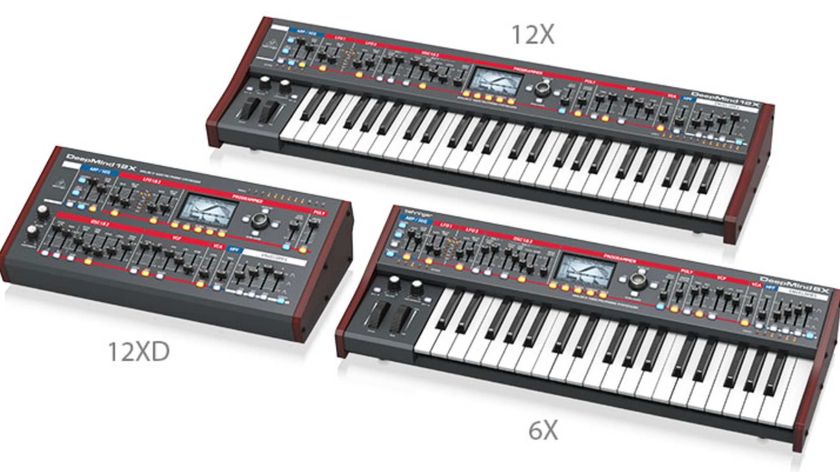Fall Out Boy's Andy Hurley: “For a long time, I had doubts that I could play drums anymore”
Drummer reflects on his evolution as a player and the importance of heavier side projects
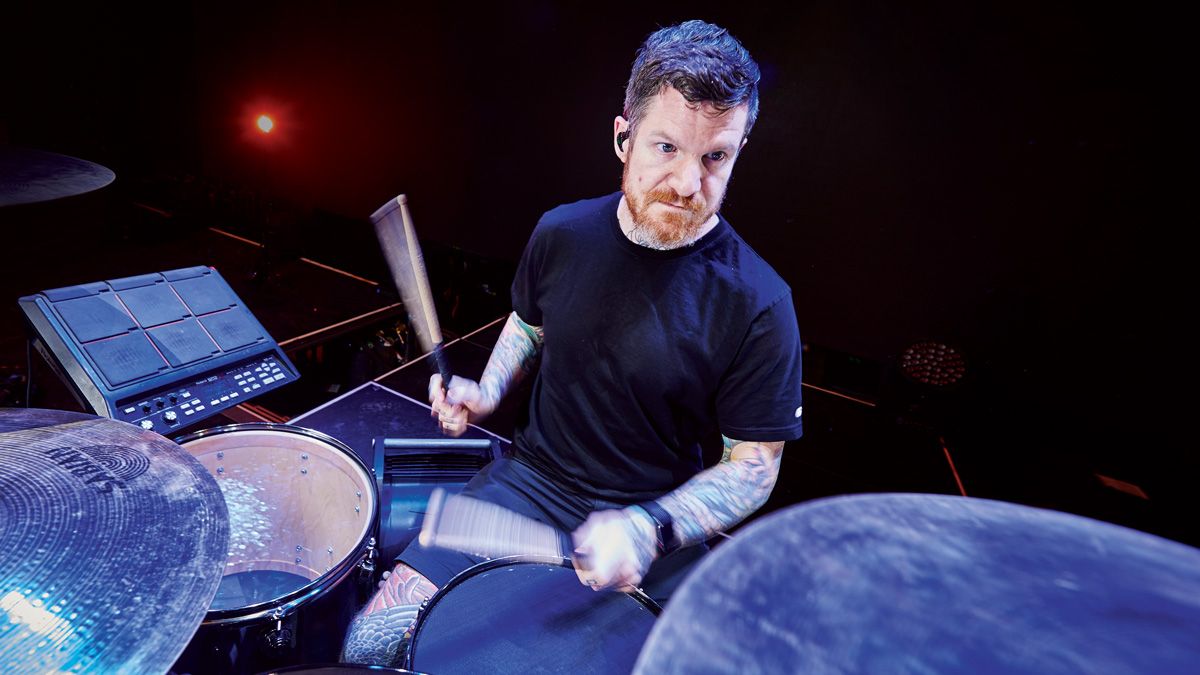
Fall Out Boy first emerged from the early 2000s hardcore punk scene in Chicago.
The band - formed by bassist Pete Wentz, guitarist Joe Trohman and guitarist/singer Patrick Stump - stood head and shoulders above the competition with their extraordinary melodies, gigantic hooks and Stump’s incredible vocal.
People really started to take note with the release of debut album Take This To Your Grave in 2003, the first Fall Out Boy music to feature straight-edge, heavy metal-loving Andy Hurley on drums. The album was a pop-punk masterpiece that established Hurley as a force to be reckoned with behind the kit - equal parts Travis Barker and Dave Lombardo.
The band went on to achieve monumental success with follow-up album From Under The Cork Tree, which spawned mega hit Sugar We’re Goin Down, followed by Infinity On High and Folie à Deux. While shy guy Andy wasn’t a huge fan of the ever-increasing limelight, he let his memorable drum parts do the talking. By 2010 Fall Out Boy were burned out and a three-year hiatus was quickly announced.
Andy fed his passion for heavy metal and hardcore punk, recording and touring with bands including Enabler and Earth Crisis, and forming heavy rock band The Damned Things with Trohman. Andy still uses downtime from Fall Out Boy to play with hardcore band, Sect. Fall Out Boy returned refreshed and fighting fit in 2012, releasing three chart-topping albums in a row, culminating in this year’s Mania.
While the band’s sound has evolved through the years, their core DNA remains, and Fall Out Boy continue to sell out arenas around the world. We hooked up with Andy Hurley during the recent UK tour to learn more about the band’s incredible journey.
You joined Fall Out Boy around 2003. What were the circumstances surrounding that?
Get the MusicRadar Newsletter
Want all the hottest music and gear news, reviews, deals, features and more, direct to your inbox? Sign up here.
“I was in hardcore bands with Pete [Wentz] for years. At the time I was going to college and playing in three bands. That’s why they didn’t ask me to join when they first started, but they needed someone to fill in for a tour and then they were recording some demos.
"The guy producing it, Sean O’Keefe who also produced Take This To Your Grave, asked if I could play on them. I loved the music they were making. The music being written for the demos, which became Take This To Your Grave, was the best stuff I had ever been a part of.”
How would you describe your drumming at the time?
“I think I reached my peak back then and I’ve been coasting on that for 15 years! Not really. I think that’s probably when I started coming into my own as a drummer, being in bands and figuring out how to play with a band. Joining Fall Out Boy was the best education for that.”
Did you have much recording experience before Take This To Your Grave?
“I’d recorded with a few projects, but never anything like that. We recorded a lot of it in Madison, at Butch Vig’s studio [Smart Studios]. It was the biggest studio and the biggest thing we’d done. There was a microphone that Kurt Cobain used in that studio! Everything I’d done [before that] was with friends, or in much smaller studios.”
What did you learn from the experience?
“Confidence. For a long time, even on From Under The Cork Tree and Infinity On High, I had doubts that I could play anymore. From Under The Cork Tree was the first major label record we did, so that was an even bigger thing than Take This To Your Grave. I guess Take This To Your Grave was the beginning of finding comfort - of knowing what I’m doing and not over thinking it.”
From collaborating so much I’m better at hearing what the core DNA rhythm is in a song
Between Take This To Your Grave and Mania, Fall Out Boy’s sound has evolved. Would you say your drumming has developed in tandem with that?
“Maybe a little. After the hiatus there was a bigger tweak. I think it follows with being in a band with songwriters who have specific ideas. Both Joe [Trohman] and Patrick [Stump] have certain things they want accented on the drums, so every aspect of every song is a collaborative thing.
"I might have an idea for a kick pattern and it totally goes against the vocal pattern. I think the evolution is just being more subservient to what the song requires. On Mania, it’s the most real drums you’ll hear on songs in the modern Fall Out Boy era. On the last couple of records there’s drums for the whole thing, but a lot of times they’re mixed with drum loops or cut up.”
From Under The Cork Tree and Infinity On High are the band’s biggest-selling albums. What do you remember about the writing and recording and did you have an inkling they were going to be hits?
“I think we knew that we’d written some great songs and a great album, but I don’t think we had any idea it would be as big as it was. I think it was just a belief that this is the best work we’ve done to this point. You can rally behind that.
“There was a moment in the recording of Sugar We’re Goin Down where Patrick did a take of a harmony or something and there was just a look when he came into the booth where we were like, ‘This is a hit!’ He’s got an amazing voice and I think that is a big reason for our success. He’s just so talented. Obviously, that’s all bluster and jokes in the studio; you have no idea if anyone will care.”
Did those two albums come together fairly easily?
“Cork Tree... and Infinity... took work. Sugar… went through a lot of different iterations before it became the song that it was. The original verse I remember I hated. The idea for what the verse became happened last minute, right before recording. That saved it for me.
"There was a lot of stuff that we had to hash out in the rehearsal space for both albums. I don’t really hear the songs until I’m in the studio now. It’s become much more on the fly, which I really love. I think different ideas come to me more than if I had the time to do what I’d normally feel like doing. It’s more instinctive.”
The drum parts are a key element of Fall Out Boy’s sound. How much input comes from the other guys?
“Patrick is a drummer and so he’s big on specific rhythms and patterns. And Joe, with The Damned Things stuff - there were a lot of specific things he wanted. Other bands I’ve played in recently have had people who were either drummers or really adept at writing drum parts in their demoing.
"I really like when there’s a specific thing that someone wants to hear. I think that from collaborating so much I’m better at hearing what the core DNA rhythm is in a song to begin with.”
Do you remember a point at which things were getting noticeably bigger for Fall Out Boy?
“I guess it was the Warped Tour in 2005, the year From Under The Cork Tree came out. That was us and My Chem. It was the year where it was getting pretty crazy. Even the year before, we had a show on some really small stage, I think it was in Detroit, and the crowd was too big and they knocked the fence down.
"There were a few shows like that here and there, but that year of Warped Tour was where every show felt like that.”
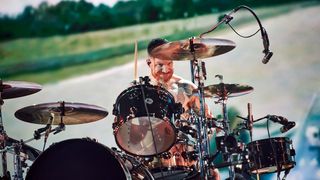
Then things went stratospheric! You seem a fairly private guy. How comfortable did you feel with the limelight?
“It was something you get used to. I definitely don’t like photoshoots, but I’m pretty comfortable with it now. For stuff like [drum magazines] it’s just me, but with the full band it’s a little easier because I can be the fourth person in the group and don’t necessarily have to carry it. That’s usually Pete. He’s really photogenic and good at that stuff.”
The size of gigs changed dramatically too...
“I’ve been doing Sect shows during any off-time from Fall Out Boy. The weekend before we came out here I was in the midwest for three shows. We played a VFW [Veterans of Foreigh Wars] hall, a basement and a small club.
"To be honest, that actually makes me more nervous than playing an arena. I’m used to [big shows]. I can’t focus on any one person. A basement show, where there’s going to be at most 50 people, I can see everyone and any mistakes are bigger because I’m right in front of them.
"I’m more comfortable because I feel more plugged into something at a smaller show, but I also feel like I have to play better. Actually, I don’t have to worry about a lot of stuff at a show this size, whereas I worry a lot about the Sect shows because I have to make sure I have a kit, bring a snare and cymbals. I’ll confess, I’ve forgotten sticks once before! That’s all coming from a situation where I don’t have to worry about it.”
Which drum parts would you say define your playing in Fall Out Boy?
“Take This To Your Grave is the one where I was trying to emulate Travis Barker and guys like that the most. I was playing more beats that go around the kit.
"I think there’s stuff on Mania in terms of fills or just a stripped-down beat that I’m most proud of. Last year my big inspiration in terms of drumming was Danzig’s Chuck Biscuits. I think he’s just one of the best drummers because he’s so hard hitting. He’s playing exactly what’s needed.
"His fills, while simple, are better than a fill I would choose to do. I was a Dave Lombardo-influenced drummer growing up, so I tried to call Chuck’s spirit into my playing more on Mania.”
You’ve played on plenty of hardcore and metal albums too. What do you consider to be your drumming highlights outside of Fall Out Boy?
“I think the Enabler record has a lot of stuff I’m really proud of. Sect is probably the highlight of my musical career. The last record we did, which came out last year, is called No Cure For Death. Stylistically, what’s being played is really fun, it’s fast and fill-y and double bass-y and blast beat-y. But it’s also about the people in it.
"There’s a guy from Earth Crisis, who were one of my favourite bands growing up. The singer was in Cursed, which is my favourite hardcore band. They’re also a vegan straight-edge band, which is important to me.”
Fall Out Boy took a break between 2010 and 2012, during which time you stayed busy with a number of different music projects. Was it important to do things that were completely removed from FoB?
“I don’t think the impetus was that it needed be different, I think it was just about doing stuff. The hiatus was really difficult because you become so institutionalised to having a schedule laid out for a year and a half to two years. When you don’t have anything, at that time it was really difficult for me. It was depressing.
"You spend all this time on tour being like, ‘I just wish I was home and had nothing to do.’ Then you have nothing to do for two weeks and you’re like, ‘I have no idea what to do with my life.’
“A lot of cool opportunities came. That’s where I met Earth Crisis through a mutual friend who was managing them and I filled in on a tour. Then I did the Enabler record and some tours with that. The Damned Things was the big one. That was awesome. I think that more just speaks to the fact that heavy metal and hardcore is the kind of music I grew up with.”
Did you take time to work on your playing during that period?
“No. I met Tomas Haake from Meshuggah and asked him what he does to warm up or practise at home. He said, ‘Nothing’. When he’s off he goes fishing. He doesn’t touch drums. That’s the case for me.
"On the hiatus I was playing a lot more with friends’ bands and staying busy with that. Tomas said that he got to a place where he could play what he wants to play and then coasted, I guess.
"I can play all the kinds of music I want to play and that’s what I love about music. I’ve never been a dude who’s practising every day to play crazier stuff.
“My drum tech, Brandon, plays in this band Misery Signals. He’s the best drummer I know. He’s so technically proficient. He practises every day for two hours. He’s always pushing himself to be better. I’ve just never had that drive. But that’s not to say that when there’s something I want to play in a band and I’m not able to nail it I won’t practise and really work on things.”
Did you return to Fall Out Boy with renewed vigour?
“Totally. We couldn’t come back putting out the same records and we wouldn’t want to. That challenge to evolve with the times is fun and it keeps things interesting. I definitely think the break cleared my palette so I could plug in to the new form that Fall Out Boy existed in easier than if I wasn’t doing these projects that let me loose.
“On the Sect and Enabler records I’d do takes of just fills - just filling through a whole song and figuring out what works best. It’s interesting because coming back from hiatus, that’s what I did for Fall Out Boy. I’d do takes of just the beat that’s going to be mixed with a loop or whatever and then we’d do takes of fills, just to see if something comes out of it.”
A lot of bands that came up at the same time as Fall Out Boy are no longer about. You guys are still releasing Number 1 albums and selling out big venues. What do you think it is that keeps people coming back for more?
“I’m really thankful for the opportunity and the fact that people still care. I don’t really fully understand why. We try to evolve and push our boundaries, because we want to and because it’s a challenge to us to do something different every time while maintaining the DNA that makes us who we are. Maybe that’s something that speaks to people, the fact that we’re still inspired to make music that we love.”
If you hadn’t joined Fall Out Boy, what would you be doing today?
“I just watched an interview with [Star Wars actor] John Boyega on Desus and Mero’s podcast. It’s called Bodega Boys. They just talk about pop culture stuff. They asked John Boyega what he’d be doing if he wasn’t acting and he said, ‘This is what I’d be doing’. This was his one option, there was no plan B. I feel the same way. If I’m not doing this I’ll be dead. If I wasn’t in this band I’d be in another band, that’s for sure.”
I'm MusicRadar's eCommerce Editor. In addition to testing the latest music gear, with a particular focus on electronic drums, it's my job to manage the 300+ buyer's guides on MusicRadar and help musicians find the right gear for them at the best prices. I dabble with guitar, but my main instrument is the drums, which I have been playing for 24 years. I've been a part of the music gear industry for 20 years, including 7 years as Editor of the UK's best-selling drum magazine Rhythm, and 5 years as a freelance music writer, during which time I worked with the world's biggest instrument brands including Roland, Boss, Laney and Natal.
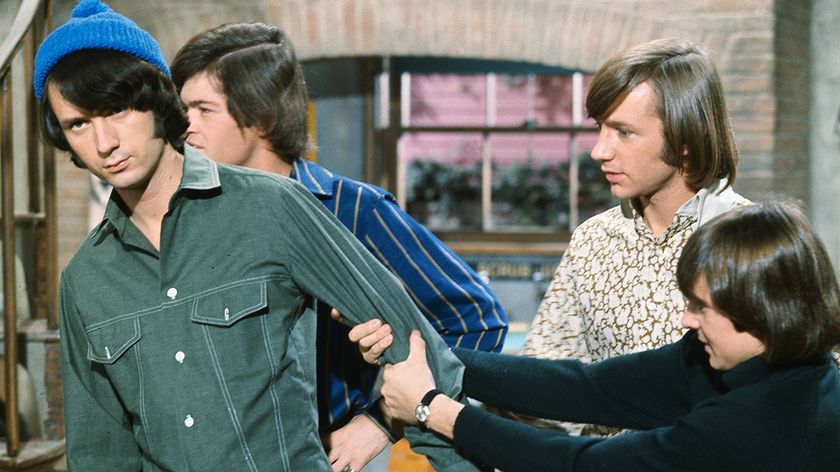
"They said, ‘Thank you, but no thank you - it’s not a Monkees song.’ He said, ‘Wait a minute, I am one of the Monkees! What are you talking about?’": Micky Dolenz explains Mike Nesmith's "frustration" at being in The Monkees
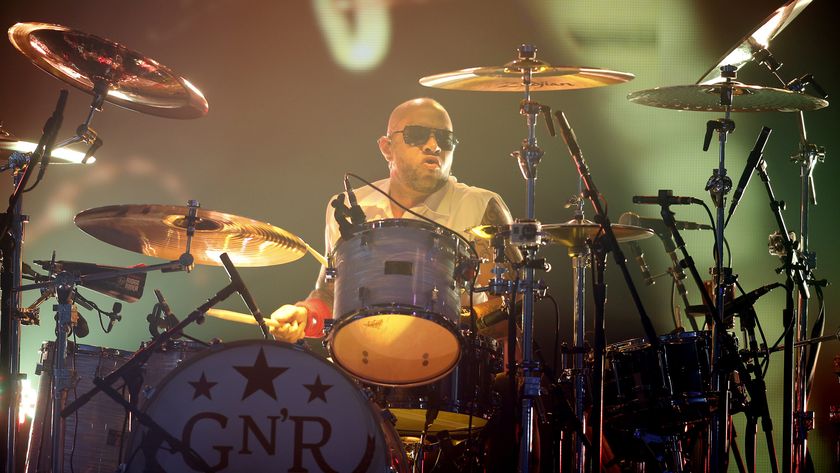
“There’s nights where I think, ‘If we don’t get to Paradise City soon I’m going to pass out!’”: How drummer Frank Ferrer powered Guns N’ Roses for 19 years

